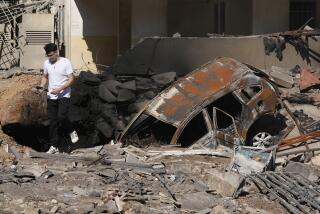White House says airstrike killed Islamic State’s second-in-command
- Share via
Reporting from Washington — A U.S. military airstrike in northern Iraq has killed Fadhil Ahmad Hayali, second in command of Islamic State and primary coordinator for moving weapons and fighters to militant strongholds in Iraq and Syria, the White House and Pentagon said Friday.
The Iraqi-born militant, also known as Hajii Mutazz, was killed Tuesday with another militant in a vehicle near Mosul, the group’s self-declared capital in Iraq, officials said.
Hayali was in charge of Islamic State operations in Iraq, was a member of the Sunni group’s ruling Shura Council and served as senior deputy to the overall leader, Abu Bakr Baghdadi.
U.S. officials said his death marks a loss, if not a setback, for the leadership of an extremist group that now controls vast stretches of territory in Iraq and Syria.
Hayali’s death “will adversely impact [Islamic State] operations given that his influence spanned ... finance, media, operations and logistics,” Ned Price, spokesman for the National Security Council, said in a statement.
Price described Hayali as “primary coordinator for moving large amounts of weapons, explosives, vehicles and people between Iraq and Syria.”
U.S. intelligence analysts say Hayali was a colonel in the Iraqi army before the U.S.-led invasion toppled Saddam Hussein in 2003 and disbanded his army. Hayali later joined Al Qaeda in Iraq, which led deadly attacks on U.S. troops in Iraq and ultimately spawned Islamic State.
U.S. officials said Hayali helped plan Islamic State military advances over the last two years in Iraq, including the militants’ stunning assault on Mosul in June 2014. At the time, convoys of heavily armed fighters waving black flags swept in from Syria, and the much larger Iraqi military fled in disarray.
Armed with U.S.-supplied arms and armored vehicles that government troops had abandoned, the militants used Mosul to launch an offensive that pushed nearly 250 miles south to the edge of Baghdad, the capital, before President Obama announced the start of an air war last August to try to stop them.
The administration has since sent more than 3,000 military advisors to Iraq to help train the army, and coalition warplanes and drones have launched more than 4,000 airstrikes in Iraq and Syria on Islamic State positions and convoys in Iraq and Syria.
Capt. Jeff Davis, a Pentagon spokesman, said coalition forces detained Hayali in Iraq in 2005, but he was later turned over to the Iraqi government. Although Hayali said he was a bookkeeper and arms runner for Al Qaeda at the time, Davis said, he ultimately was released.
Christopher Harmer, a military analyst at the Institute for the Study of War, a nonpartisan public policy group in Washington, said Hayali’s death isn’t likely to have much impact on the efforts to recapture Iraqi cities and towns from the insurgents.
Islamic State has recruited numerous former senior officers from Saddam Hussein’s army into its forces, he noted, giving them a surprisingly experienced corps of military leaders who are fighting on their own ground.
“So it’s good news that the U.S. has killed this senior leader,” he said. “But I don’t expect it will have much of an impact, because [Islamic State] has such a deep bench.”
Although U.S. officials early this year had hoped pro-government Iraqi forces could retake Mosul by this summer, that effort has been shelved indefinitely.
Instead, Iraqi troops and coalition warplanes launched a joint offensive in mid-July to recapture Ramadi, west of Baghdad. That effort appears to have bogged down.
“Right now all the U.S. is trying to do is kill our way out of the problem,” Harmer said. “Killing these guys after they establish the caliphate, and get their recruiting networks running well, is a bit like closing the barn door after the horses get out.”
Follow @wjhenn for military and defense info.
More to Read
Sign up for Essential California
The most important California stories and recommendations in your inbox every morning.
You may occasionally receive promotional content from the Los Angeles Times.














